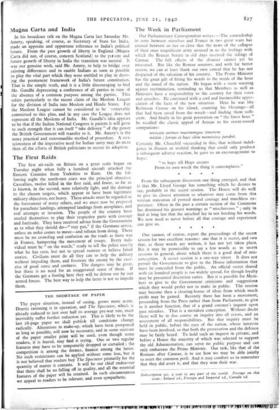Magna Carta and India
In his broadcast talk on the Magna Carta last Saturday Mr. Amery, speaking, of course, as Secretary of State for India, made an apposite and opportune reference to India's political future. From the past growth of liberty in England (Magna Carta did not, of course, concern Scotland) to the prlsent and future growth of liberty in India the transition was natural. It was our genuine wish, said Mr. Amery, to help to bridge over existing differences and to enable Indians as soon as possible to play the vital part which they were entitled to play in devis- ing the permanent framework of India's future constitution. That is the simple truth, and it is a little discouraging to find Mr. Gandhi deprecating a conference of all parties in view of the absence of a common purpose among the parties. This refers particularly to the recent claim of the Moslem League for the division of India into Moslem and Hindu States. Ent the Moslem League cannot be considered to be 'retrievably committed to this plan, and in any case the League does not represent all the Moslems of India. Mr. Gandhi's idea appears to be that if the Indian National Congress is patient it will grow to such strength that it can itself " take delivery " of the power the British Government will transfer to it. Mr. Amery's is the more practical and statesmanlike method of procedure. A con- sciousness of the imperative need for Indian unity may do mcre than all the efforts of British politicians to secure its adoption.






























 Previous page
Previous page